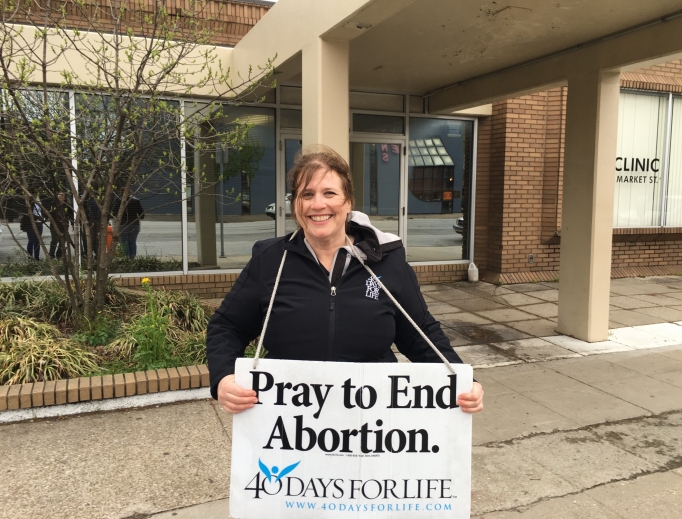Changing Hearts and Minds — and Saving Lives: The Good Work of 40 Days for Life
The organization’s 2019 spring campaign continues effort to help moms and their babies.

This spring a woman stopped to tell volunteers keeping vigil by the Nashville, Tennesse, abortion business that she didn’t go into the facility a year ago because she saw pro-life people praying outside.
Today, she has a 5-month-old baby.
Among those volunteers was Jeff Coleman, regional coordinator of the Nashville, Tennessee, area spring and fall 40 Days for Life campaigns, Learning of such “saves” is proofs 40 Days for Life touches hearts and changes minds — as illustrated in Unplanned, now in theaters. Coleman feels blessed to share these stories.
“Last year a gentleman and his wife in the area didn’t go in because we were out here,” Coleman told the Register. The man later came to show the volunteers a picture of his baby son. Coleman repeated the man’s grateful words: “This is only possible because you were standing out here, so we didn’t want to go in. Thank God. You saved the child. This is the happiest thing we’ve done.”
40 Days for Life launched in 1998 in Bryan/College Station, Texas, and has been a force for good ever since.
Another poignant story involves a mother and daughter who returned on Day 28 of the 40-day spring campaign (Day 1 was March 6).
As usual, when he arrived at the day’s site, Coleman first put a sign on his truck that proclaimed, “Real Men Support Born and Unborn.” Later that day he noticed a note on his truck.
Coleman shared the moving contents. “She said, ‘Just wanted you to know you made a difference in my daughter’s decision today. The sign on your truck was the third sign from God. Thank you, and God bless you.’”
When mother and daughter later returned and spoke to him in person, Coleman remembers the mother telling him: “That sign on your truck was the final message we needed to keep the child.”
Of these and other saves, the coordinator does not keep an official record count. “I let God keep the count.”
Helpful Neighbors
In Flossmoor, Illinois, 32 miles south of Chicago, Dr. Richard Mantoan, a dentist, is the regional coordinator of the area’s 40-Days campaign. He’s served as a coordinator several times in the past, beginning 10 miles away at a facility that was a referral-only for surgical abortions elsewhere. Last year, though, he got “an uncomfortable feeling” when the building next door to his dental office was undergoing a big renovation. He was told vaguely that “some medical providers were going to take it over.” In January 2018, Planned Parenthood opened a surgical clinic.
“We were quick to get a 40 Days for Life started here that February, so it’s an ongoing mission,” he said. “This year, on Friday, March 15, I wasn’t here but got a call from one of our vigil volunteers excited they had a save” around noon.
Mantoan described to the Register how a “couple came out of the building and had smiles on their faces. They stopped and rolled down their window. The woman said, ‘We’re keeping our baby! Here’s the daddy.’ They thanked them for being there. There were about eight volunteers, and it really gave everybody a big shot in the arm. It was the first directly known save we could document. Being there can make a difference.”
Mantoan added that people in his parish’s respect-life ministry and friends involved in pro-life work formed a coalition to get a Catholic women’s health center to open next door to the Planned Parenthood. “For the last month literally next door we had a place where we can hand out information and help,” he said,” to women going in there intentionally or sometimes thinking they’re going into Planned Parenthood.”
He knows such witness — including signs like his that proclaim “Love Them Both and Smile” and “Life’s a Gift” — is “having an effect” and adds that “Planned Parenthood itself says their no-show rate for abortions goes up when there are [pro-life] people out there.”
The first week of April, 40 Days for Life’s founder Shawn Carney told the Register about twins being saved the day before he spoke to the Register. “There’s something about twins,” he said happily. They get “the most attention of the many emails we send out. It resonates with a woman who sees the twins on an ultrasound.”
It’s not unusual for twins to be saved, as this set was in Houston. “It’s happened during every 40 Days for Life campaign,” Carney said.
Momentum Continues
With 446 lives known saved throughout the spring campaign, Carney emphasized that “so much momentum” was built during the campaign. “We had more campaigns this spring — 377 cities — and we had a major motion picture release [Unplanned] that shows that the 40 Days for Life campaign is peaceful.” He added that since the beginning of 40 Days for Life campaigns in 2007, they have seen 186 workers leave their abortion-industry jobs.
Carney also noted that Sue Thayer, a former Planned Parenthood abortion manger is now on the 40 Days for Life staff to help and is the only Planned Parenthood manager to lead a local 40 Days for Life campaign. Adding all these plusses together, including the fact that the 40 Days for Life campaigns have been carried out at one time or another in 56 countries and 816 cities, Carney said: “It’s wonderful to see so much growth and impact and see how God has used something so simple and so basic — connected to the Gospel, prayer, fasting and showing up — to save lives and change hearts of those working in the abortion industry. Particularly during Lent we need to turn to him for the results. And we’re definitely seeing results.”
Results like those Laura Grijalba is seeing in downtown Louisville, Kentucky, where the campaigners include different men’s groups and husbands and wives together praying 24 hours a day. This is a prime 40 Days for Life location because people come from around the state and even from Nashville to the EMW Women’s Surgical Center (not owned by Planned Parenthood).
During the spring campaign five different women in one week decided to keep their babies. “They were reached out to by different counselors,” she told the Register. As campaign director for this area, Grijalba shared the details coming from the particular counselors involved at the moment of the saves.
“One woman came in pregnant with her fifth child and she said, ‘How am I going to take care of another child?’ The father didn’t want the abortion. We reached out to her, talked to another sidewalk counselor, and we said we can throw a baby shower. The woman chose life.”
Another baby was also saved that day. Two days after that, two more babies were saved. At the end of the same week, at 9am on March 16, when volunteers from Sacred Heart Church in Jeffersonville, Indiana, were praying with 40 Days for Life, “another counselor was praying and saw a couple coming out of the abortion clinic,” Grijalba said. “One of the men went to talk to the woman, who told him, ‘We decided we could not have an abortion.’”
“The pro-life volunteers tell the vulnerable women: “You don’t have to do this. We’re here to help,” Grijalba explained. “I’m sure they [the couple] heard the sidewalk counselors.”
She said that up to 75% of abortion businesses’ no-shows are due to pro-life people praying outside. “When we’re praying peacefully, we never know how many women drive past and don’t schedule [an abortion] for the next day — or don’t go in at all,” though some do come back and tell them, “I couldn’t have an abortion because I knew you were praying for me.”
Next to the abortion clinic is a pregnancy help center, so when counselors ask if the women or couples need help, they can provide immediate aid.
“We have things called ‘blessing bags,’” Grijalba said. “In the bag there are pro-life brochures for them to have the resources [for] how to choose life and about all the resources in the local area — and a onesie, tissues, lotion; a little something encouraging for the woman to tell her — and she knows that — we care and that there is hope out there.”
Chelsea’s Story
One day Grijalba was sidewalk counseling and met a woman named Chelsea who was without hope as she and her 3-year-old Alizah got out of a taxi and headed to the abortion facility.
Grijalba described how “the Holy Spirit guided her” at that moment. She said, “You don’t want to go in there and pay $300 for an ultrasound when you can get a free ultrasound … where there are good Christian moms that can help you.”
Chelsea Pickett shared the story with the Register. “She asked, ‘Do I want to go there to see the baby?’” Chelsea looked at her, the 3-year-old grabbed Grijalba’s hand, and Chelsea agreed to walk to Bsideuforlife, the pregnancy center next door to the abortion clinic for a free ultrasound. “They talked to me.” All this helped her, she said, “make the decision to keep the baby.”
But the pro-life help didn’t stop there.
Grijalba, Chelsea said, “was at the hospital when I had the baby (Braylon). She helped me get everything I need, as far as a crib, changing table and helped with my appointments. She’s been there every step of the way. She actually encouraged me to make my own organization” that helps “all mothers, any mother in need, not just single mothers.”
What would Chelsea say to women who feel hopeless and are considering an abortion? “I would tell them that there’s the light at the end of the tunnel. When you’re on the train and in a tunnel, you don’t hop off the train before you get out of the tunnel. At the moment you think your life’s over, but there’s more to it.”
The story continues. “Chelsea has become another daughter to me and sister to our family,” Grijalba said.
“She calls me her stepmom, and I am so honored by that. Braylon is the sixth baby that God used me to save from abortion that I know of! Every woman who I helped choose life said ‘Thank you’ for being there for me.”
Joseph Pronechen is a Register staff writer.

















